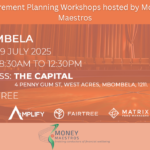After almost 30 years in the financial services sector, the final 14 as a CEO of a profitable company, I believed that this was it: I’d reached the pinnacle of a successful life. Besides my professional qualifications and career, I had played sports at a national level, flown planes and had a healthy sense of self. Or so I thought. I honestly believed I’d achieved everything I wanted. The only niggling feeling of failure was related to my personal life and intimate relationships.
A chance reading of a post by Dr Roddy Carter promoting his recently published book, Fireside Wisdom: Conversations to Inspire Personal Mastery changed me. Not just because Dr Carter and I were high-school classmates but because something else resonated deeply within me.
My parents gifted me the book which I read over the Christmas break. I was riveted. An unsettling realisation became obvious: my mindset was my greatest impediment. I was jeopardising my own life through my thoughts, assumptions and responses. It was difficult to admit that I wasn’t leading the wonderful life I thought I was and that my brain was the obstacle! This book gave me a sense of how my mind “works” – with all the cognitive, emotional and spiritual elements that make for happiness and fulfilment. Using cutting-edge neuroscience, Dr Carter unravels the complex interplay between our thoughts, emotions and personal satisfaction. The path to success and happiness is about making your mind your best friend.
A subsequent catch-up call where we reminisced about our school days became the gateway to an insightful three-month odyssey that revolutionised my perspective on life. Dr Carter’s candid admission that he wished he understood this science earlier in life was inspirational: Compassionate Neuroscience outlines all the untapped resources within each one of us. These resources have impacted every part of my life. Yes, I thought I had it all, but I found out how much I was missing. What a pity we don’t learn how to operate our brains much earlier in our lives.
After our conversation, Dr Carter kindly couriered me his first book, Body Wealth: Journey to Abundance. During my career, I tailored, set and implemented financial plans achieving anticipated results. Once I familiarised myself with the ideas associated with Compassionate Neuroscience, I was hooked and was keen to participate in the Unstoppable YOU programme. Admittedly, my initial focus was on my failed personal relationships where I felt “stuck”.
I enrolled for the 14-week Unstoppable YOU programme, which had me devoting 90 minutes every week to my feelings, fears and a sense of self-awareness. My “people-pleasing” tendencies soon emerged: I tend to think about the well-being and happiness of others at my own expense. I learnt, through the Brain Operating System, to manage my fears, identifying and confronting the justifications I use as excuses.
Gradually, I identified the traits enriching my life and those sabotaging it. Time spent reflecting and writing enabled me to plan the life, professional and personal, that I ultimately want. Ironically, I have been doing this for my clients for decades, creating bespoke financial solutions for them while I completely ignored my personal development. It’s easy to let the numbers translate into a “successful” life. Through the Brain Operating System, I discovered what was to become one of my favourite concepts in the programme: the idea of “psychic push-ups”. When we initially confront our fears and negative perceptions, it’s uncomfortable and difficult. Over time, the benefits of “psychic push-ups” become evident – easier to practice and the rewards are priceless.

After completing the lessons on Owning the Office of the CEO (read: mastering your brain), Clearing the Filter, Conquering Fear and Driving Belief, I noticed some fundamental shifts in how I handle personal relationships. As time went by, I began to understand and appreciate my assets and strengths, the positive character traits that were serving me well and the triggers which were negatively impacting my life. Admittedly, I needed to delve much deeper into my thoughts, feelings and fears. The simple exercises required by the programme taught me to pause, explore, think, question, challenge and disagree with what I had effectively been doing most of my life to understand the person whom Dr Carter refers to as the authentic you or the “you you”.
Reflecting on the past eight months, it’s almost surreal to recall my initial state of mind. In today’s tumultuous world, rife with technological advancements and information overload, the programme stands as a beacon for personal mastery and resilience. To echo the words of Ralph Waldo Emerson, “The only person you are destined to become is the person you decide to be.” It is that simple.









